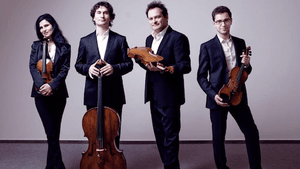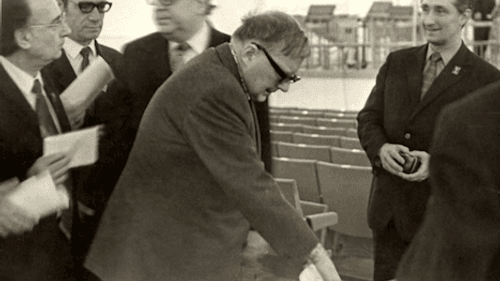Stay in the Loop
BSR publishes on a weekly schedule, with an email newsletter every Wednesday and Thursday morning. There’s no paywall, and subscribing is always free.
Early, middle, and late
Philadelphia Chamber Music Society presents Schubert and Shostakovich

Over the next two months, the Philadelphia Chamber Music Society will present six of the finest string quartet ensembles in the world. With the Philadelphia Orchestra’s well-publicized difficulties, it is some relief to turn to an organization that functions well, enjoys a warm rapport with its community, and presents excellent programs.
This season’s first ensemble was the London-based Belcea Quartet. Its founding members, Corina Belcea and Krzysztof Chorzelski, are Romanian and Polish, respectively, while Axel Schacher and Antoine Lederlin are French. Belcea, the first violinist, is the group’s leader.
A tale of two composers
The Belcea’s program consisted of the first and last of Franz Schubert’s 15 string quartets, and the midmost of Dmitri Shostakovich’s 15: The Eighth. Schubert’s 15 quartets were compressed into a compositional span of 13 years, with the last written when the composer was 29. Shostakovich was 31 before he composed his First Quartet, and 53 at the time of his own Eighth.
Shostakovich’s Eighth has an end-of-life, or at least a dead-end feel, although Shostakovich lived 15 more years, producing five symphonies as well as two concertos and seven more quartets. Schubert’s last quartet, in contrast, while a deeply serious work, abounds in the vitality of a man coming to the height of his powers with every expectation of enjoying them for a considerable time to come.
Exactly 800 works in the Deutsch catalogue of Schubert’s compositions come between the first of his quartets, D. 87, and the last, D. 887. The First, composed at age 16, is an astonishingly precocious work, showing a sophisticated awareness of the sonic possibilities of four stringed instruments and a grasp of the literature, at least through the end of the Classical period. The cutting-edge quartets of his time were Beethoven’s three “Rasoumovsky” quartets, but these were so revolutionary no one would begin to grapple with their legacy until Brahms.
Slow and steady
The First Quartet begins with a singing line on the first violin, and Belcea projected from these first notes her particular strength as a superb legato and astonishing pianissimo. She can play with volume and vigor, but enjoys indulging her aptitude, with occasional mixed results. It makes for fairly slow readings; the Schubert 15th, normally a 40-minute work, came in at 55. In fairness, it did not drag, although the Trio section of the Scherzo Allegro vivace felt deliberately undervoiced.
You never do want late Schubert to end, and it is the composer’s particular genius that his repeats are so subtly varied it seems the music really could go on forever without wearing out its welcome. By the time of the 15th — composed just as Beethoven was completing the last of his string quartet series — it is clear that young Schubert was measuring himself against his revered master, and in certain respects holding his own.
Shostakovich’s Eighth Quartet was written in 1960, at a moment of deep crisis. He survived the denunciation of his music by Soviet authorities in 1936 and 1948, and even a credible threat not only to his art but also his life. This new crisis was not artistic but moral: he was forced to join the Communist Party, which he reviled, and as a further humiliation, to accept the position of chairman of the Union of Composers, where he would be a mouthpiece for the regime.
Sound and fury with significance

The Eighth Quartet was his response. It is the most popular and frequently performed of the Shostakovich quartets, but it was a personal dirge — Shostakovich even wanted to subtitle it, “To the Memory of a Composer.” Its five movements, three of them Largos, are full of pointed quotations from the signal works of his career, in particular his long-suppressed opera, Lady Macbeth of the Mtsensk District, whose performance was still forbidden. This might have made for mere pastiche in lesser hands, but the Eighth is a profoundly integrated work that makes its dark impression from first bar to last, with its faster inner movements suggesting a variation on the overall mood rather than any lightening of it.
The Belcea Quartet performed this work in the fashion of late Beethoven, as music going where no music had gone before, at least spiritually, and wrung from it a sense of a suffering beyond pain itself, particularly in Belcea’s playing. There are other ways of performing the music, but none I have heard that so intimately grasped its tragic character. The Perelman Theater audience appeared to grasp, in turn, that it enjoyed a very special experience. Shostakovich instructed that his final quartet be played so slowly — it consists entirely of Adagios — any audience would flee the hall in boredom. He had endured the unendurable, and he required the same of any who would listen.
The Belcea ended with a Shostakovich encore, the savage middle movement of his Third Quartet. Most ensembles would have left a two-hour program at that, or taken the edge off with something light. Even Shostakovich has lighter moments, but the Belcea chose to end in fury.
What, When, Where
The Belcea String Quartet. Franz Schubert, Quartet in E-flat Major, D. 87; Dimitri Shostakovich, Quartet No 8, Op. 110; Schubert, Quartet No. 15 in G, D. 887. Oct. 17, 2016 at the Perelman Theater of the Kimmel Center, 300 S. Broad St., Philadelphia. (215) 893- 1999 or pcmsconcerts.org.
Sign up for our newsletter
All of the week's new articles, all in one place. Sign up for the free weekly BSR newsletters, and don't miss a conversation.

 Robert Zaller
Robert Zaller